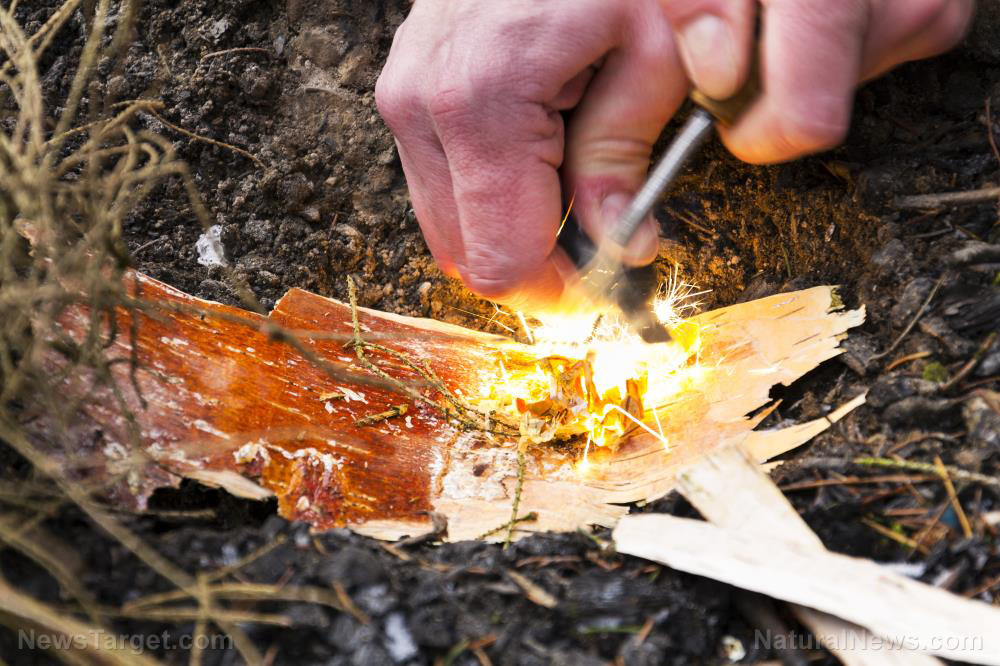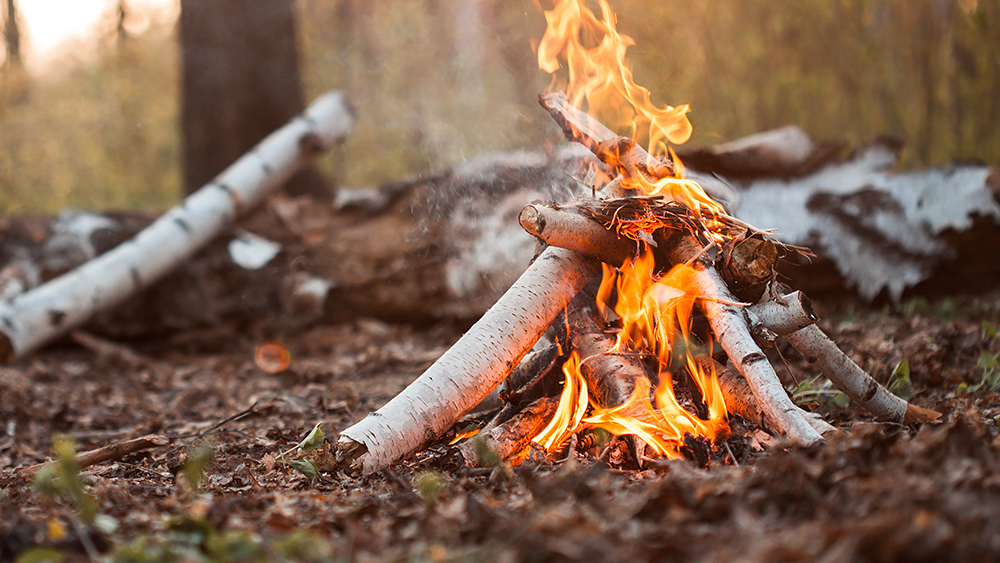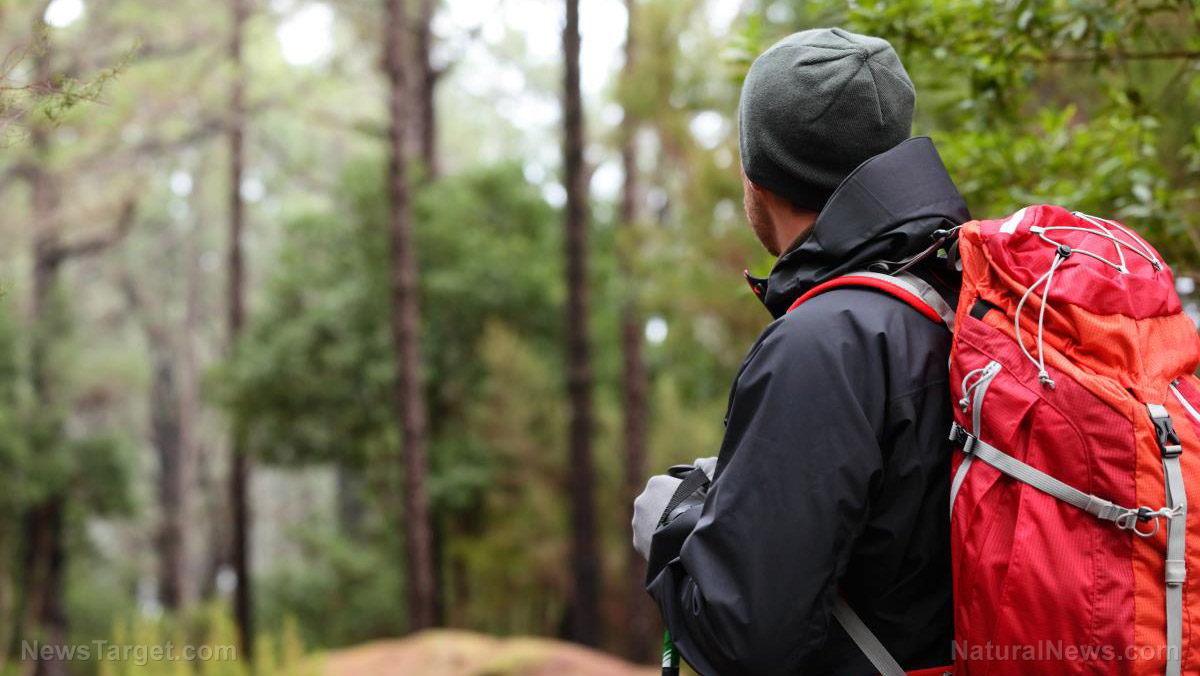
As a prepper, you should always be ready to deal with the inevitable. This means having a get-home bag in your car or at work and having a bug-out bag at home so you can evacuate with the necessary gear if SHTF.
But if disaster strikes and you lose your survival gear, the tips below can help you survive in the wilderness even if you only have the most basic tools in your possession.
Improvised zipper fishhook
If you have a spare zipper, you can make an improvised fishhook. Break off the zipper from your jacket or pants and carefully break the loop.
Pull out the loose end to a 90-degree angle and use a rough stone to grind the exposed tip down into a sharp point. Attach your improvised zipper fishhook to a length of fishing line.
Alternatively, you can turn the ring tab from a discarded soda can into a fishhook.
If you're traveling in an area that's near a body of water, prepare a DIY survival fishing kit and keep it in your pocket so you can fish even if you lose your gear. Get an empty tin box or a small waterproof container and store basic fishing gear in it.
You should have the following items in your survival fishing kit:
- 50 Feet of fishing line
- Assorted fishing hooks
- Bait or fake worms
- Bobbers
- Sinkers/weights
- Fishing lures
Bullet casing arrowheads
If you find bullet casings, you can repurpose these into makeshift arrowheads. Grab a large rock and pound the casing flat.
Remove the uncrushable rim by bending the metal back and forth until it breaks off. Next, get a coarse stone and begin grinding down and sculpting the metal into your desired arrowhead shape.
When you're done, you should have a sharp and strong metal arrowhead.
Dry wet boots with hot rocks
If your boots accidentally get wet while hiking, there's a faster way to dry them instead of putting them near a campfire.
Gather several large, dry and non-porous rocks and place them on the edge of your campfire. Wait until the rocks are piping hot, then use a couple of sticks to carefully place them inside your boots.
This ensures that your boots dry out more quickly and thoroughly as they're drying from both the outside and the inside.
Housekey "saw"
If you have keys with you when SHTF, you can turn them into a small makeshift saw. Use a key to make the small notches required for basic traps and various other tools.
Sock lint tinder
Cotton and wool are flammable natural materials. If you're wearing cotton or wool socks, pluck off loose strands and fibers to make a DIY flammable tinder pile.
Use your firestarting tool to throw a few sparks until the sock fibers combust into flames. (Related: Survival skills: Learn how to cook from scratch so you can feed your family when SHTF.)
Pine mosquito repellent
Mosquitos and other insects are repelled by the scent of pine. If you're swarmed by mosquitoes, grab a bunch of pine needles, crush them up in your hands, then rub the oils they release onto your clothes. The oils should help keep the mosquitoes away.
Another option is to burn pine needles over your fire for an ambient insect repellent for your whole camp.
Flint rock cutting tool
If you have no knife and you need a sharp cutting tool, look for flint rocks. These rocks are usually beige with a shiny black interior.
Grab two flint rocks and smash them together. After you crack them open, grab some chipped-off small flakes or fragments with a razor-sharp edge.
Multipurpose paracord
Replace ordinary boot laces with seven-strand 550 paracord. This ensures that if you need emergency cordage, you can pull out some of the strong inner strands.
If you don't have paracord, you can also just remove the whole shoelace from one boot. Use the strong string to start a fire with a bow drill.
Birthday candle firestarter
Add a small birthday candle to your survival kit. If your lighter is running out of fuel or you're almost out of matches, you can transfer the flame to the candle so you have more time to start a fire with it.
Backpack padding tinder
If your bug-out bag has straps with foam padding, the material might be flammable. Should you need emergency tinder, cut out a few pieces of the foam then use your firestarter to vigorously drive sparks into them to produce fire.
Don't breathe in the fumes because they are toxic.
Plastic water bottle firestarter
If you have a plastic water bottle with a convex curve, angle it right in front of the sun to focus down the sun's rays like a magnifying glass to start a fire.
Plastic bottle water purifier
If you need clean, safe drinking water but all you have is a plastic bottle, with the right techniques you can still boil and purify water over the fire. The plastic bottle can withstand the intense heat of the fire without melting or deforming if it's full of water to keep the water firm.
You can also use plastic bottles to filter water.
If you only have dirty pond water, cut the bottle in half. Use the bottom as a boiling cup and the top as a water filter.
To make the filter, pierce a few holes into the lid. Next, gather some moss, grass and some small stones for the top half. Carefully pour the dirty water through the makeshift filter and it will come out much cleaner.
Boil the filtered water using the lower half of the water bottle and place it into the fire. Keep the fire small and under control and watch as the water begins to boil. When you're done you should have a cup of clean drinkable water and a reusable intact cup and filter.
Note that this method releases toxic carcinogenic plastic chemicals into the water so only use it as a last resort.
DIY chopsticks
Your hands can get dirty after SHTF. If you're worried about getting sick if you eat with dirty hands, you can avoid potential illness by eating with a pair of makeshift chopsticks.
Split a stick down the middle and place a twig or stone in between the cut. Use the DIY chopsticks to grab and eat food without worrying about bacteria.
Dunk the chopstick tips in boiling water to completely sterilize them when you're done eating.
Charcoal firestarter
If you have to move to a different location and are worried about how you'll get your next fire lit, grab a large piece of leftover charcoal and take that with you.
With a ferro rod you can reignite the charcoal back into a glowing ember for a new campfire.
Soda can mini stove
If you find a discarded soda can, use it to make a portable windproof stove to cook on. First, cut into the side of the can from the top down. Slice across the top and bottom until you have an "I"-shaped cut. This is your "window."
Peel the window open and you're good to go. Place the tinder and kindling inside the can, then light it up. Now you have a portable cooking stove.
Mini ferro rods as zipper pulls
Pre-drill two small holes on a small piece of ferro rod. Thread some cordage into the pre-drilled ferro rods and attach it to your jacket zipper pull or strings so you always have an incognito firestarting device on you.
Smartphone tool: signal mirror
If your smartphone runs out of battery or is no longer working, take it apart to make various survival tools.
Remove the screen and all of the back screen elements. After several layers, you will find a mirror. Use this as a signal mirror to reflect and flash sunlight signals into the cockpits of planes or helicopters to get their attention and ask for help.
Smartphone tool: circuit board arrows or cutting tool
Use smartphone circuit boards to make two tools.
First, you can make DIY arrowheads. Either carefully snap the circuit board or vigorously grind them down against a rock into the desired arrowhead shape. Since circuit boards are quite soft, you can easily grind them down.
Alternatively, you can create a sharp cutting tool with a circuit board. Use a rough stone to grind an angle into the edge to make a DIY knife for cutting cloth or shaving wood.
Headphones snare
If your smartphone comes with headphones, use it to make wire snares for small game.
Speaker magnet compass
Behind the speaker elements of your phone you will find a magnet. Use it to make an improvised compass.
You also need a small metal strip made either of iron or stainless steel. Use a needle from a first aid kit, a hairpin, a section of a metal hair clip, or a metal pin from a watch strap.
Rub the magnet down the length of the metal pin for several minutes. This will magnetize the metal pin and it will have an attracting and repelling magnetic pole.
To use the pin compass, place it on something that floats like a leaf. Place the leaf on a cup of water or a still puddle.
Once it floats the pin will rotate and eventually settle after it aligns itself with the Earth's north and south magnetic poles so you have a north to south direction or line. This is how regular compasses work.
Usually, the end of the pin that's pointing the furthest away from the sun will be north and the end of the pin that's pointing closest towards the sun will be south.
Keep in mind that this is only true for the northern hemisphere. For the southern hemispheres, those directions are reversed.
Before SHTF, prepare a survival bag with tools that can help you find food, filter water and start a fire in the wilderness. Use the tips above to make improvised tools if you lose your gear.
Watch the full video below to learn more about 20 wilderness survival tips.
This video is from the SHTFPrepping101 channel on Brighteon.com.
More related stories:
Advanced prepper tips to take your prepping to the next level.
Prepping tips: Scavenging in the city when SHTF.
Home gardening tips: How to start a survival orchard.
Sources include:
Please contact us for more information.





















